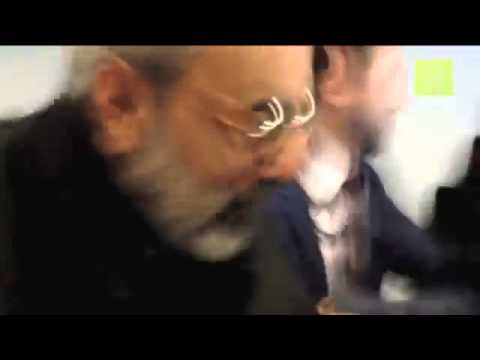The Geneva II conference on Syria is as much a propaganda contest as it is a stage for political discussions. That has given critics of the Assad regime a rare opportunity to challenge Damascus’ officials.
Anne Barnard and Hwaida Saad report for The New York Times:
For Syrian officials, a lakeside idyll here, far from their country’s war, has been marred by what plainly feels to them like an endless stream of impertinent questions.
They have been asked why their government is bombing its citizens, when their president is leaving office, what happened to a British doctor who died suspiciously in a Syrian government prison. They have even been offered the coordinates of jihadist fighters — and asked if they will drop bombs on them instead of on civilians.
The questions that gall them the most, judging by their reactions, are not from the foreigners whose queries they are accustomed to viewing as part of a “media war.” The ones that really nettle them come from Syrians.
VIDEO: Journalists, including activist Rami Jarrah, try to question Information Minister Omran al-Zoubi
Opposition activists and citizen journalists pop up everywhere: in hotel lobbies, on sidewalks, even at a breakfast table overlooking snowcapped mountains. They hound the officials with a doggedness reminiscent of Michael Moore’s hunt for Roger Smith, then the chief executive of General Motors, in his classic documentary “Roger & Me.”
It is an encounter that neither side has experienced before, and in some ways it is the most significant thing taking place at a peace conference that has been more about optics than results. Here in neutral and secure Switzerland, Syrian government delegates used to meeting journalists only inside a government-controlled bubble are finding that almost anyone can come up to them anytime, anywhere, and ask anything.
It is a surreal experience, too, for Syrian activists like Adnan Hadad of Aleppo, who sees it this way: “If we tried this in Syria, they would torture us to death.”
New encounters — some cordial, some not — have swept Syrians of all stripes out of their comfort zones. That could make a difference eventually, in a war so polarized that opposing sides do not even agree on basic facts, let alone on how to solve the conflict and on who is most responsible.
Yet the government bubble is far older than the war. An Arab journalist who worked in Syria for years said government delegates probably had “never seen, let alone spoken to, anyone in the opposition.”
So for them to sit across from Haitham al-Maleh, an opposition delegate in his 80s who is a former political prisoner, is “historic,” the journalist said, “as if people from the Stalinist system suddenly sat down with Solzhenitsyn or Sakharov.”
“ ‘Darkness at Noon,’ you have to think in these terms,” the journalist added, referring to the book about Soviet repression and speaking anonymously to freely express his personal views.
New encounters have taken place on a lower level, too. Old friends now on opposite sides shake hands, or avoid each other. Crammed in with the activists in media rooms are journalists from Hezbollah’s Al Manar channel and the state-run Syrian news media — an unusually large delegation, leading activists to suspect that some are there to keep an eye on colleagues rather than to report.
On the first day of the conference, in nearby Montreux, Mr. Hadad, 29, and another antigovernment activist, Rami Jarrah, waded into a crowd of demonstrators who support Syria’s president, Bashar al-Assad. With a cameraman, they asked them if they would accept Mr. Assad’s ouster through negotiations. Many protesters answered politely, but others yelled, “God, Bashar and nothing else!” and began shoving and shouting. A man grabbed Mr. Hadad’s phone and threw it.
“This is what they do in the middle of Europe. Imagine what they can do to people in Syria,” Mr. Hadad said.
“They do not respect other opinions,” Mr. Hadad said. “The way they respond is by violence.”
Inside, another opposition journalist, Ahmad Zakariya, asked Omran Zoubi, the government’s information minister, when Mr. Assad would resign. Mr. Zoubi exclaimed: “Assad won’t leave! Assad won’t leave!” Then a man grabbed Mr. Zakariya from behind and crumpled his press card.
Later, in Geneva, the deputy foreign minister, Fayssal Mekdad, chided Mr. Zakariya for asking if Mr. Assad was using starvation as a weapon. “Yes, that is one of the allegations made by the terrorist groups,” he said. “Maybe you are representing one of them.”

